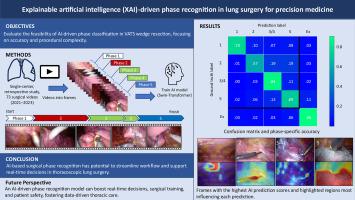Artificial intelligence-driven phase recognition in lung surgery: a single-centre pilot study☆
引用次数: 0
Abstract
Introduction
Effective surgical specimen management during lung resection is crucial for accurate analyses and treatment. Minimally invasive techniques complicate workflows; thus, artificial intelligence (AI)-based solutions are needed to improve their safety and efficiency. We assessed the feasibility of AI for the automated classification of surgical phases in thoracoscopic wedge resection, examining the link between classification accuracy and surgical complexity, particularly during specimen extraction.
Patients and methods
This single-centre retrospective observational study from Japan included 73 video recordings of video-assisted thoracic surgery lung wedge resections with extraction of a single specimen carried out from January 2021 to December 2023. A Swin Transformer AI model was used to classify five distinct surgical phases: preparatory actions, lesion identification, resection, and specimen extraction. Pre- and postprocessing techniques improved model performance across different phases. The primary outcome was AI model performance in classifying surgical phases using metrics such as accuracy, precision, recall, and F1 score.
Results
The modified AI model achieved an overall accuracy of 0.778, with phase-specific accuracies ranging from 0.574 to 0.911. Significant improvements were observed in critical phases for specimen management (accuracy: 0.816). Clinical factors, including the number of access ports and phase duration, were key determinants of accuracy.
Conclusions
Our AI-driven phase recognition model for thoracoscopic lung surgery videos shows potential for optimizing operating room workflow, enhancing real-time decision-making, and improving efficiency by automating surgical phase classification.

人工智能驱动的相位识别在肺外科手术中的应用:一项单中心试点研究
在肺切除术中有效的手术标本管理是准确分析和治疗的关键。微创技术使工作流程复杂化;因此,需要基于人工智能(AI)的解决方案来提高它们的安全性和效率。我们评估了人工智能在胸腔镜楔形切除术中手术阶段自动分类的可行性,研究了分类准确性和手术复杂性之间的联系,特别是在标本提取过程中。患者和方法这项来自日本的单中心回顾性观察性研究包括了从2021年1月至2023年12月进行的视频辅助胸外科肺楔形切除并提取单个标本的73个视频记录。Swin Transformer AI模型用于划分五个不同的手术阶段:准备动作、病变识别、切除和标本提取。预处理和后处理技术提高了模型在不同阶段的性能。主要结果是人工智能模型在使用准确性、精密度、召回率和F1评分等指标对手术分期进行分类方面的表现。结果改进后的人工智能模型总体精度为0.778,相位特定精度为0.574 ~ 0.911。在标本管理的关键阶段观察到显著的改善(准确性:0.816)。临床因素,包括访问端口的数量和阶段持续时间,是准确性的关键决定因素。结论基于人工智能的胸腔镜肺手术视频阶段识别模型具有优化手术室工作流程、增强实时决策能力、通过手术阶段自动分类提高手术效率的潜力。
本文章由计算机程序翻译,如有差异,请以英文原文为准。
求助全文
约1分钟内获得全文
求助全文

 求助内容:
求助内容: 应助结果提醒方式:
应助结果提醒方式:


